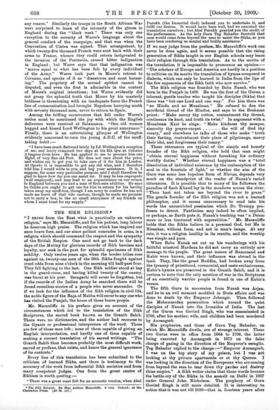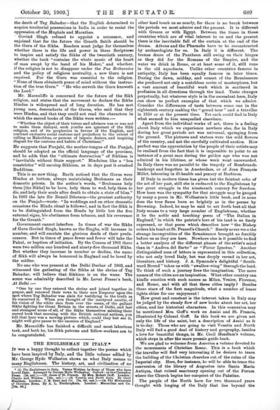THE SIKH RELIGION.* "I BRING from the East what is
practically an unknown religion," says Mr. Ma,cauliffe, and for his patient, long labour he deserves high praise. The religion which has inspired our once brave foes, and our since gallant comrades in arms, is a religion which should command the respect and the sympathy of the British Empire. One need not go back to the dark days of the Mutiny for glorious records of Sikh heroism and loyalty, nor seek in the past for splendid specimens of Sikh nobility. Only twelve years ago, when the border tribes rose against us, twenty-one men of the 36th Sikhs fought against cruel odds from nine o'clock in the morning till half-past four. They fell fighting to the last. One Sikh soldier stood at bay in the guard-room, and having killed twenty of the enemy, was burnt at his post. Saragarhi will never be forgotten, but if the records of the Indian Army be searched there will be found countless stories of a people who never surrender. Or if we look for the influence of the Sikh religion in civil life, the noble figure of the Raja of Nabha will occur to any one who has visited the Punjab, the home of these brave people.
Mr. Maxauliffe in his preface gives an account of the circumstances which led to the translation of the Sikh Scriptures, the sacred book known as the Granth Sahib. There were no dictionaries, and the author had recourse to the Gyanis or professional interpreters of the word. There are few of these men left ; none of them capable of giving an English interpretation, and hardly one of them capable of making a correct translation of his sacred writings. "The Granth Sahib thus becomes probably the most difficult work, sacred or profane, that exists, and hence the general ignorance of its contents."
Every line of this translation has been submitted to the criticism of learned Sikhs, and there is testimony to the accuracy of the work from influential Sikh societies and from many competent judges. One from the great centre of Sikhism is worth quoting:—
" There was a great want felt for an accurate version, when Akal • The Sikh Religion. By Max Arthur Macaulifie. 6 vols. Oxford: at the Clarendon Pram l.R33. net.1 Purukh (the Immortal God) induced you to undertake it, and fulfil our desires. It would have been well, had we executed the translation ourselves ; but Akal Purukh granted you the credit of the performance. As tho holy Guru Teg Bahadur foretold that men would come from beyond the seas to assist the Sikhs, so you have been rendering us mental and bodily assistance."
If we may judge from the preface, Mr. Macauliffe's work can never be done again, and it seems possible that the rising generation of Sikhs taught in our English schools may learn their religion through this translation. As to the merits of the translation it is impossible to pronounce an opinion :— " The scholars of Europe and America are hardly in a position to criticise on its merits the translation of hymns composed in dialects, which can only be learned in India from the lips of the few exponents of the Sikh faith who now survive."
The Sikh religion was founded by Baba Nanak, who was born in the Punjab in 1409. He was the first of the Gurus, a tolerant, gentle teacher who taught his disciples (Sikhs) that there was "but one Lord and one way." For him there was "no Hindu and no Musalman." He refused to don the sacrificial thread of the Hindus, and says to the Brahman priest: "Make mercy thy cotton, contentment thy thread, continence its knot, and truth its twist." In argument with a Musalman Kazi he sings "Make kindness thy mosque, sincerity thy prayer-carpet the will of God thy rosary," and elsewhere he talks of those who make "truth their fasting, contentment their place of pilgrimage, mercy their idol, and forgiveness their rosary."
These utterances are typical of the simple and homely founder of the Sikh religion, -who held that man might "obtain eternal happiness without forsaking his ordinary worldly duties." Whether eternal happiness was a "total dissolution of individual existence by the reabsorption of the soul in the fountain of light," or whether the aim of the Guru was some less hopeless form of Nirvan, depends very much on the standpoint of the reader of Nanak's varied utterances. It is possible that to many of his followers the paradise of Sach Khand lay in the meadows across the river. "Thou East not taken me beyond the river to graze."
The gentle founder of the Sikh religion was not a learned philosopher, and it 'seems unnecessary to read into his words the unrestricted pessimism which Dr. Trumpp pro.
fesses to detect. Pantheism may indeed be often implied, or perhaps, as Barth puts it, Nanak's teaching was "a Deism more or less tinctured with superstition." Mr. Macauliffe holds that the Sikhs believe in a personal God, but He is Nirs.nkar, without form, and not in man's image. At any rate, it was a religion healthy in its results, and the worship was simple and pure.
When Baba Nanak set out on his wanderings with his faithful minstrel Mardana he did not carry an entirely new message to the people. The great names of Ramanand and Kabir were known, and their influence was abroad in the land. They, like the great Buddha, had broken away from the tyranny of priesthood, ceremonial, and caste exclusiveness. Kabir's hymns are preserved in the Granth Sahib, and it is curious to note that the only mention of war in the Scriptures of an essentially warrior people is found in one of Kabir's verses.
The fifth Guru in succession from Nanak was Arian, and he in an evil moment meddled in State affairs and was done to death by the Emperor Jehangir. Then followed the Mohammedan persecution which turned the quiet disciples of Nanak into the Ironsides of India. The last of the Gurus was Govind Singh, who was assassinated in 1708, after his mother, wife, and children had been murdered by Aurangzeb.
His prophecies, and those of Guru Teg Bahadur, on which Mr. Macauliffe dwells, are of strange interest. These
two Gurus were in office from 1664 to 1708, the latter being executed by Aurangzeb in 1675 on the false charge of gazing in the direction of the Emperor's seraglio. Teg Bahadur replied to the charge :—" Emperor Aurangzeb, I was on the top story of my prison, but I was not looking at thy private apartments or at thy Queens. I was looking in the direction of the Europeans who are coming from beyond the seas to tear down thy pardas and destroy thine empire." A Sikh writer states that these words became
the battle-cry of the Sikhs in the assault on Delhi in 1857 under General John Nicholson. The prophecy of Guru Govind Singh is still more detailed. It is interesting to notice that it was not till 1689—that is, fourteen years after the death of Teg Bahadur—that the English determined to acquire territorial possessions in India in order to resist the oppression of the Mughals and Idarathas.
Govind Singh refused to appoint a successor, and enjoined that for the future the Granth Sahib should be the Guru of the Sikhs. Readers must judge for themselves whether there is the life and power in these Scriptures to inspire and satisfy the Sikhs of the twentieth century, whether the book "contains the whole music of the heart of man swept by the hand of his Maker," and whether, if the religion is not to disappear under the Pax Britannica and the policy of religious neutrality, a new Guru is not required. For the Guru was essential to the religion. "None of them obtaineth peace of mind without the instruc- tion of the true Guru." "He who serreth the Guru knoweth the Lord."
Mr. Macauliffe is concerned for the future of the Sikh religion, and states that the movement to declare the Sikhs Hindus is widespread and of long duration. He has met young men, descendants of the Gurus, who said that they were Hindus, and that they could not read the characters in which the sacred books of the Sikhs were written :—
"Whether the object of their tutors and advisers was or was not to make them disloyal, such youths are ignorant of the Sikh religion, and of its prophecies in favour of the English, and contract exclusive social customs and prejudices to the extent of calling us lialechhas, or persons of impure desires, and inspiring disgust for the customs and habits of Christians."
He suggests that Punjabi, the mother-tongue of the Punjab, should be adopted as the official language of the province, and he adds that the "ultimate destruction" of Sikhism is "inevitable without State support." Hinduism like a "boa constrictor" will envelop Sikhism, as in days past it crushed Buddhism.
This is no new thing. Barth noticed that the Gurus were Hindus at bottom, always maintaining Brahmans as their domestic priests. In the author's words, " Brahmans help them [the Sikhs] to be born, help them to wed, help them to die, and help their souls after death to obtain a state of bliss." In 1883 the late Sir Denzil Ibbetson—the greatest authority on the Punjab—wrote : "In weddings and on other domestic occasions the Hindu ritual is followe'l, and in fact the Sikh is to be distinguished from the Hindu by little but the five external signs, his abstinence from tobacco, and his reverence for the Granth."
Government cannot interfere. In times of war the Sikhs of Guru Govind Singh, known as the Singhs, will increase in number, and will emulate the glorious deeds of their prede- cessors. But in times of peace fewer and fewer will take the Pahul, or baptism of initiation. By the Census of 1901 there were two million one hundred and ninety-five thousand Sikhs.
But whether they increase in number or decline, the name of Sikh will always be honoured in England and be loved by the soldier.
No one who was present at the Delhi Durbar of 1903, and witnessed the gathering of the Sikhs at the shrine of Teg Bahadur, will believe that Sikhism is on the wane. The scene was admirably described in Mr. Lovat Fraser's book, At Delhi :—
"One by one they entered the shrine and joined together in prayer, and renewed their vows to their new Emperor upon the spot where Teg Bahadur was slain for testifying to the truth as he conceived it. When you thought of the martyred ascetic, of his vision of the white race from over the ocean, of the gallant Sikhs fighting for Great Britain in the streets of Delhi, and last and strangest scene of all, of the Sikhs themselves saluting their sacred book that morning with the British national anthem, you felt that here was a moving picture which, could they but see it, might well give pause to the enemies of England."
Mr. Macauliffe has finished a difficult and most laborious task, and both he, his Sikh patrons and fellow-workers are to be congratulated.











































 Previous page
Previous page